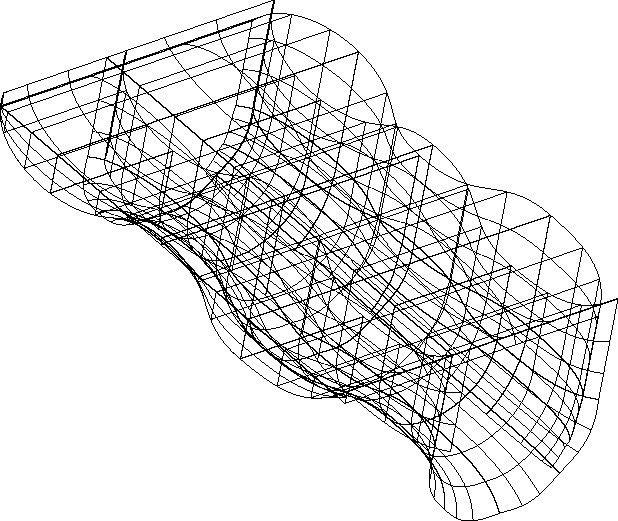The architecture of reality
Deconstructing reality, AI divination and creative academic collaboration
We interrupt your regular scheduled Unreality programming to bring you some brilliant guest content. I had a topic in mind for this week that I was all ready to dive into until I received an email from Dr Kevin Walker with something I had to share straight away.
The architecture of reality
For a bit of back story, I was lucky enough to be introduced to artist and researcher Kevin Walker via Coventry Creates - a programme created to support collaborations between artists and researchers. Kevin's researched focus was introduced to me as generally around AI and creativity, although it turns out it’s a lot more (interesting) than that. We had our first meeting recently and found some fascinating overlaps between our areas of interest and research.
Out of our conversations, Kevin has written a great piece on the (de/re)construction of reality titled “The architecture of reality”.
It does seem counterintuitive to send you straight off to read something else but let’s just go with it today. In the rest of this newsletter I’m going to share some of the thoughts I’ve had in response to this piece and discussions with Kevin more generally. Read his article first or just dive straight on in to my response, I’ll let you choose.
Constructing realities
The act of perception, in [von Foerster’s] view, is the act of invention, and as such, based on our individual biases, limitations and experience, we might see what’s not there, and we might miss or ignore what is there
In the overview of different approaches to defining reality, of course I lean towards the Heinz von Foerster extreme of reality as entirely subjective (something I’m always harping on about). Yet I’m also never one to say there is a definitive answer to anything, so I love considering the a multitude of approaches to making sense of what we call reality.
I’m really taken with Federico Campagna’s metaphysical theatre stage analogy, the backdrop to reality that determines what is possible within it, in the same way as a stage set determines the type of action that will take place in a scene. For me, this really resonates with my oft-repeated opinion that art provides a space in which reality can be momentarily different and un/redefined. If the stage sets of reality tend to employ a prescriptive Belasco realism, art provides a welcome Brechtian minimalism.
At the end of the article, Kevin suggests that if you want to offer people a different form of reality to the one they know, you must build the bridge to take them there - an erudite articulation of what I consider the main driver of my arts practice. Perhaps in some ways this newsletter is also one of those bridges.
AI and divination
One big point of interest that has emerged for me out of discussions with Kevin is the relationship of AI to different forms of knowledge. The knowledge that traditionally makes up the ‘intelligence’ part of artificial intelligence tends toward a fairly narrow range of formats - recommendation/prediction systems, speech recognition, and practical applications like self-driving cars and being really good at chess.
This evidently favours a specific type of knowledge - with a contemporary Western scientific leaning. But of course there are plenty of other types of knowledge, arising from different cultures, traditions and spiritual origins. See for example: “It’s taken thousands of years, but Western science is finally catching up to Traditional Knowledge”.
What would it look like to train AI on one of these different forms of knowledge?
Many applications of AI are largely about prediction. Using large amounts of data to make predictions on new scenarios. If one million people clicked the link to Facebook after Google searching the letter F, user one million and one probably also wants to go to Facebook (because they meant to go to the autocomplete from their browser address bar but ended up searching instead).
But what is prediction if not the cousin of divination? A method of making a prediction or judgement based on some form of information. That information can come in any number of formats - see the wiki article on Methods of divination for some fun and brilliantly named examples.
Could you train an AI oracle? An AI cartomancer or astrologer? David Benqué considers some of these ideas in the project almanac.computer, which “frames all predictions as modes of relating events on earth to cosmic forces, interrogating the legitimacy assigned to some forms of speculation over others.”
parts of this cosmic imaginary of data and prediction have been amplified and legitimised, they are now called "data analytics" or even "artificial intelligence". Other parts, such as astrology, have been discarded as illegitimate forms of speculation in breach of scientific rationality.
David Benqué
A lot of reality/unreality to unpack there. It’s really interesting finding myself paired with Kevin as a collaborator because I probably would have told you previously I’m incredibly uninterested in AI. But I realise I’d be specifically referring to the boring technical stuff, or the ubiquitous ‘watch out, evil AI is coming to destroy humanity’ hot take. The stuff you find in articles talking about silicon valley, filled with inexplicably blue stock photos that mean nothing.
However, considering some of these more weird and intangible aspects is actually pretty exciting. I’m looking forward to seeing where the collaboration takes us, and I’ll be sure to share the launch date of this year’s Coventry Creates when it’s announced.
See you next week <3
Edie





No mention of Woodland Family Tarot here...